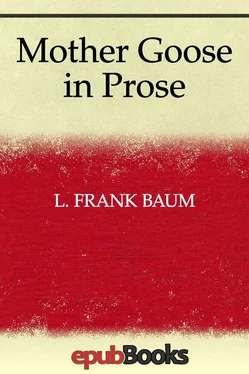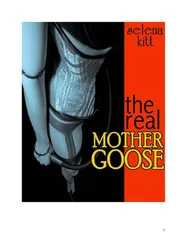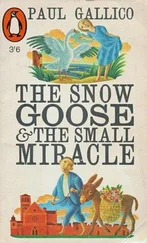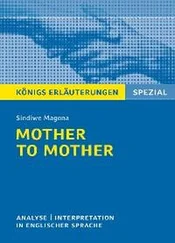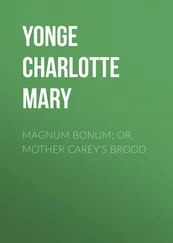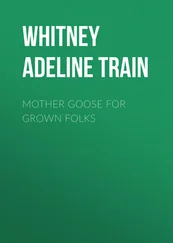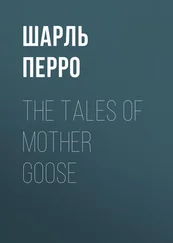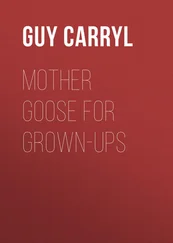"I shall not have to build again," she said; "and that is one satisfaction. I have now no more daughters to die and leave me their children, and therefore I must make up my mind to do the best I can with the sixteen that have already been inflicted upon me in my old age."
It was not long before all the grass about the house was trodden down, and the white gravel of the walks all thrown at the birds, and the flower beds trampled into shapeless masses by thirty–two little feet that ran about from morn till night. But the old woman did not complain at this; her time was too much taken up with the babies for her to miss the grass and the flowers.
It cost so much money to clothe them that she decided to dress them all alike, so that they looked like the children of a regular orphan asylum. And it cost so much to feed them that she was obliged to give them the plainest food; so there was bread–and–milk for breakfast and milk–and–bread for dinner and bread–and–broth for supper. But it was a good and wholesome diet, and the children thrived and grew fat upon it.
One day a stranger came along the road, and when he saw the old woman's house he began to laugh.
"What are you laughing at, sir?" asked the grandmother, who was sitting upon her doorsteps engaged in mending sixteen pairs of stockings.
"At your house," the stranger replied; "it looks for all the world like a big shoe!"
"A shoe!" she said, in surprise.
"Why, yes. The chimneys are shoe–straps, and the steps are the heel, and all those additions make the foot of the shoe."
"Never mind," said the woman; "it may be a shoe, but it is full of babies, and that makes it differ from most other shoes."
But the Stranger went on to the village and told all he met that he had seen an old woman who lived in a shoe; and soon people came from all parts of the country to look at the queer house, and they usually went away laughing.
The old woman did not mind this at all; she was too busy to be angry. Some of the children were always getting bumped heads or bruised shins, or falling down and hurting themselves, and these had to be comforted. And some were naughty and had to be whipped; and some were dirty and had to be washed; and some were good and had to be kissed. It was "Gran'ma, do this!" and "Gran'ma, do that!" from morning to night, so that the poor grandmother was nearly distracted. The only peace she ever got was when they were all safely tucked in their little cots and were sound asleep; for then, at least, she was free from worry and had a chance to gather her scattered wits.
"There are so many children," she said one day to the baker–man, "that I often really do n't know what to do!"
"If they were mine, ma'am," he replied, "I 'd send them to the poor–house, or else they 'd send me to the madhouse."
Some of the children heard him say this, and they resolved to play him a trick in return for his ill–natured speech.
The baker–man came every day to the shoe–house, and brought two great baskets of bread in his arms for the children to eat with their milk and their broth.
So one day, when the old woman had gone to the town to buy shoes, the children all painted their faces, to look as Indians do when they are on the warpath; and they caught the roosters and the turkey–cock and pulled feathers from their tails to stick in their hair. And then the boys made wooden tomahawks for the girls and bows–and–arrows for their own use, and then all sixteen went out and hid in the bushes near the top of the hill.
By and by the baker–man came slowly up the path with a basket of bread on either arm; and just as he reached the bushes there sounded in his ears a most unearthly war–whoop. Then a flight of arrows came from the bushes, and although they were blunt and could do him no harm they rattled all over his body; and one hit his nose, and another his chin, while several stuck fast in the loaves of bread.
Altogether, the baker–man was terribly frightened; and when all the sixteen small Indians rushed from the bushes and flourished their tomahawks, he took to his heels and ran down the hill as fast as he could go!
When the grandmother returned she asked,
"Where is the bread for your supper?"
The children looked at one another in surprise, for they had forgotten all about the bread. And then one of them confessed, and told her the whole story of how they had frightened the baker–man for saying he would send them to the poor–house.
"You are sixteen very naughty children!" exclaimed the old woman; "and for punishment you must eat your broth without any bread, and afterwards each one shall have a sound whipping and be sent to bed."
Then all the children began to cry at once, and there was such an uproar that their grandmother had to put cotton in her ears that she might not lose her hearing.
But she kept her promise, and made them eat their broth without any bread; for, indeed, there was no bread to give them.
Then she stood them in a row and undressed them, and as she put the nightdress on each one she gave it a sound whipping and sent it to bed.
They cried some, of course, but they knew very well they deserved the punishment, and it was not long before all of them were sound asleep.
They took care not to play any more tricks on the baker–man, and as they grew older they were naturally much better behaved.
Before many years the boys were old enough to work for the neighboring farmers, and that made the woman's family a good deal smaller. And then the girls grew up and married, and found homes of their own, so that all the children were in time well provided for.
But not one of them forgot the kind grandmother who had taken such good care of them, and often they tell their children of the days when they lived with the old woman in a shoe and frightened the baker–man almost into fits with their wooden tomahawks.
Little Miss Muffet
Sat on a tuffet,
Eating of curds and whey.
There came a great spider
And sat down beside her
And frightened Miss Muffet away.
Little Miss Muffet's father was a big banker in a big city, and he had so much money that the house he lived in was almost as beautiful as a king's palace. It was built of granite and marble, and richly furnished with every luxury that money can buy. There was an army of servants about the house, and many of them had no other duties than to wait upon Miss Muffet, for the little girl was an only child and therefore a personage of great importance. She had a maid to dress her hair and a maid to bathe her, a maid to serve her at a table and a maid to tie her shoe–strings, and several maids beside And then there was Nurse Holloweg to look after all the maids and see they did their tasks properly.
The child's father spent his days at his office and his evenings at his club; her mother was a leader in society, and therefore fully engaged from morning till night and from night till morn; so that Little Miss Muffet seldom saw her parents and scarce knew them when she did see them.
I have never known by what name she was christened. Perhaps she did not know herself, for everyone had called her "Miss Muffet" since she could remember. The servants spoke of her respectfully as Miss Muffet. Mrs. Muffet would say, at times, "By the way, Nurse, how is Miss Muffet getting along?" And Mr. Muffet, when he met his little daughter by chance on the walk or in the hallway, would stop and look at her gravely and say, "So this is Miss Muffet. Well, how are you feeling, little one?" And then, without heeding her answer, he would walk away.
Perhaps you think that Miss Muffet, surrounded by every luxury and with a dozen servants to wait upon her, was happy and contented; but such was not the case. She wanted to run and romp, but they told her it was unladylike; she wished to play with other children, but none were rich enough to be proper associates for her; she longed to dig in the dirt in the garden, but Nurse Holloweg was shocked at the very thought. So Miss Muffet became sullen and irritable, and scolded everyone about her, and lived a very unhappy life. And her food was too rich and gave her dyspepsia, so that she grew thin and pale and did not sleep well at night.
Читать дальше
